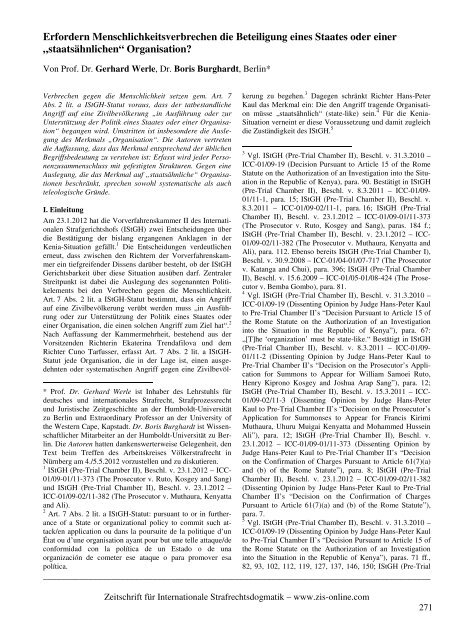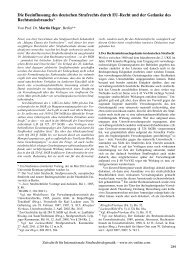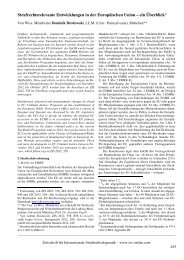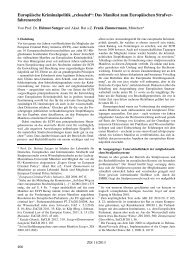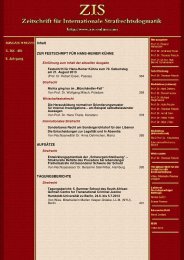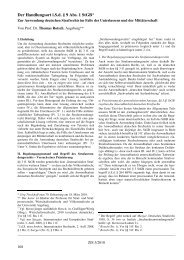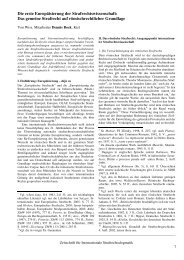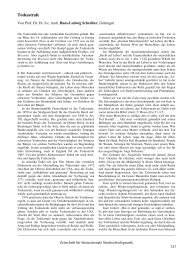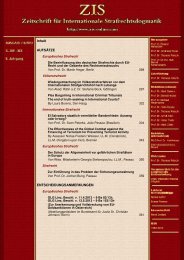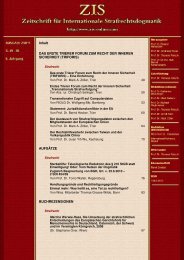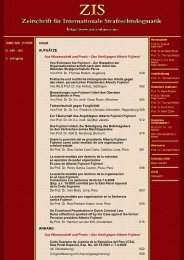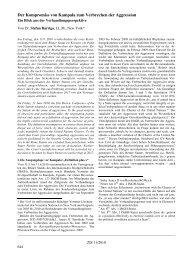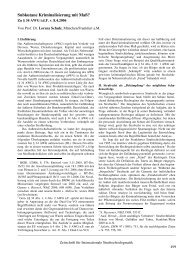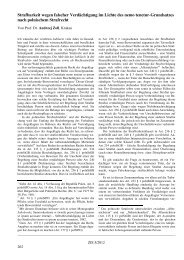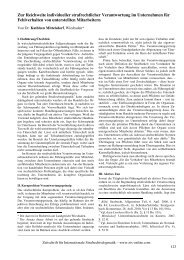Inhalt AUFSÄTZE BUCHREZENSIONEN VARIA ... - ZIS
Inhalt AUFSÄTZE BUCHREZENSIONEN VARIA ... - ZIS
Inhalt AUFSÄTZE BUCHREZENSIONEN VARIA ... - ZIS
Erfolgreiche ePaper selbst erstellen
Machen Sie aus Ihren PDF Publikationen ein blätterbares Flipbook mit unserer einzigartigen Google optimierten e-Paper Software.
Erfordern Menschlichkeitsverbrechen die Beteiligung eines Staates oder einer<br />
„staatsähnlichen“ Organisation?<br />
Von Prof. Dr. Gerhard Werle, Dr. Boris Burghardt, Berlin*<br />
Verbrechen gegen die Menschlichkeit setzen gem. Art. 7<br />
Abs. 2 lit. a IStGH-Statut voraus, dass der tatbestandliche<br />
Angriff auf eine Zivilbevölkerung „in Ausführung oder zur<br />
Unterstützung der Politik eines Staates oder einer Organisation“<br />
begangen wird. Umstritten ist insbesondere die Auslegung<br />
des Merkmals „Organisation“. Die Autoren vertreten<br />
die Auffassung, dass das Merkmal entsprechend der üblichen<br />
Begriffsbedeutung zu verstehen ist: Erfasst wird jeder Personenzusammenschluss<br />
mit gefestigten Strukturen. Gegen eine<br />
Auslegung, die das Merkmal auf „staatsähnliche“ Organisationen<br />
beschränkt, sprechen sowohl systematische als auch<br />
teleologische Gründe.<br />
I. Einleitung<br />
Am 23.1.2012 hat die Vorverfahrenskammer II des Internationalen<br />
Strafgerichtshofs (IStGH) zwei Entscheidungen über<br />
die Bestätigung der bislang ergangenen Anklagen in der<br />
Kenia-Situation gefällt. 1 Die Entscheidungen verdeutlichen<br />
erneut, dass zwischen den Richtern der Vorverfahrenskammer<br />
ein tiefgreifender Dissens darüber besteht, ob der IStGH<br />
Gerichtsbarkeit über diese Situation ausüben darf. Zentraler<br />
Streitpunkt ist dabei die Auslegung des sogenannten Politikelements<br />
bei den Verbrechen gegen die Menschlichkeit.<br />
Art. 7 Abs. 2 lit. a IStGH-Statut bestimmt, dass ein Angriff<br />
auf eine Zivilbevölkerung verübt werden muss „in Ausführung<br />
oder zur Unterstützung der Politik eines Staates oder<br />
einer Organisation, die einen solchen Angriff zum Ziel hat“. 2<br />
Nach Auffassung der Kammermehrheit, bestehend aus der<br />
Vorsitzenden Richterin Ekaterina Trendafilova und dem<br />
Richter Cuno Tarfusser, erfasst Art. 7 Abs. 2 lit. a IStGH-<br />
Statut jede Organisation, die in der Lage ist, einen ausgedehnten<br />
oder systematischen Angriff gegen eine Zivilbevöl-<br />
* Prof. Dr. Gerhard Werle ist Inhaber des Lehrstuhls für<br />
deutsches und internationales Strafrecht, Strafprozessrecht<br />
und Juristische Zeitgeschichte an der Humboldt-Universität<br />
zu Berlin und Extraordinary Professor an der University of<br />
the Western Cape, Kapstadt. Dr. Boris Burghardt ist Wissenschaftlicher<br />
Mitarbeiter an der Humboldt-Universität zu Berlin.<br />
Die Autoren hatten dankenswerterweise Gelegenheit, den<br />
Text beim Treffen des Arbeitskreises Völkerstrafrecht in<br />
Nürnberg am 4./5.5.2012 vorzustellen und zu diskutieren.<br />
1<br />
IStGH (Pre-Trial Chamber II), Beschl. v. 23.1.2012 – ICC-<br />
01/09-01/11-373 (The Prosecutor v. Ruto, Kosgey and Sang)<br />
und IStGH (Pre-Trial Chamber II), Beschl. v. 23.1.2012 –<br />
ICC-01/09-02/11-382 (The Prosecutor v. Muthaura, Kenyatta<br />
and Ali).<br />
2<br />
Art. 7 Abs. 2 lit. a IStGH-Statut: pursuant to or in furtherance<br />
of a State or organizational policy to commit such attack/en<br />
application ou dans la poursuite de la politique d’un<br />
État ou d’une organisation ayant pour but une telle attaque/de<br />
conformidad con la política de un Estado o de una<br />
organización de cometer ese ataque o para promover esa<br />
política.<br />
kerung zu begehen. 3 Dagegen schränkt Richter Hans-Peter<br />
Kaul das Merkmal ein: Die den Angriff tragende Organisation<br />
müsse „staatsähnlich“ (state-like) sein. 4 Für die Kenia-<br />
Situation verneint er diese Voraussetzung und damit zugleich<br />
die Zuständigkeit des IStGH. 5<br />
3<br />
Vgl. IStGH (Pre-Trial Chamber II), Beschl. v. 31.3.2010 –<br />
ICC-01/09-19 (Decision Pursuant to Article 15 of the Rome<br />
Statute on the Authorization of an Investigation into the Situation<br />
in the Republic of Kenya), para. 90. Bestätigt in IStGH<br />
(Pre-Trial Chamber II), Beschl. v. 8.3.2011 – ICC-01/09-<br />
01/11-1, para. 15; IStGH (Pre-Trial Chamber II), Beschl. v.<br />
8.3.2011 – ICC-01/09-02/11-1, para. 16; IStGH (Pre-Trial<br />
Chamber II), Beschl. v. 23.1.2012 – ICC-01/09-01/11-373<br />
(The Prosecutor v. Ruto, Kosgey and Sang), paras. 184 f.;<br />
IStGH (Pre-Trial Chamber II), Beschl. v. 23.1.2012 – ICC-<br />
01/09-02/11-382 (The Prosecutor v. Muthaura, Kenyatta and<br />
Ali), para. 112. Ebenso bereits IStGH (Pre-Trial Chamber I),<br />
Beschl. v. 30.9.2008 – ICC-01/04-01/07-717 (The Prosecutor<br />
v. Katanga and Chui), para. 396; IStGH (Pre-Trial Chamber<br />
II), Beschl. v. 15.6.2009 – ICC-01/05-01/08-424 (The Prosecutor<br />
v. Bemba Gombo), para. 81.<br />
4<br />
Vgl. IStGH (Pre-Trial Chamber II), Beschl. v. 31.3.2010 –<br />
ICC-01/09-19 (Dissenting Opinion by Judge Hans-Peter Kaul<br />
to Pre-Trial Chamber II’s “Decision Pursuant to Article 15 of<br />
the Rome Statute on the Authorization of an Investigation<br />
into the Situation in the Republic of Kenya”), para. 67:<br />
„[T]he ‘organization’ must be state-like.“ Bestätigt in IStGH<br />
(Pre-Trial Chamber II), Beschl. v. 8.3.2011 – ICC-01/09-<br />
01/11-2 (Dissenting Opinion by Judge Hans-Peter Kaul to<br />
Pre-Trial Chamber II’s “Decision on the Prosecutor’s Application<br />
for Summons to Appear for William Samoei Ruto,<br />
Henry Kiprono Kosgey and Joshua Arap Sang”), para. 12;<br />
IStGH (Pre-Trial Chamber II), Beschl. v. 15.3.2011 – ICC-<br />
01/09-02/11-3 (Dissenting Opinion by Judge Hans-Peter<br />
Kaul to Pre-Trial Chamber II’s “Decision on the Prosecutor’s<br />
Application for Summonses to Appear for Francis Kirimi<br />
Muthaura, Uhuru Muigai Kenyatta and Mohammed Hussein<br />
Ali”), para. 12; IStGH (Pre-Trial Chamber II), Beschl. v.<br />
23.1.2012 – ICC-01/09-01/11-373 (Dissenting Opinion by<br />
Judge Hans-Peter Kaul to Pre-Trial Chamber II’s “Decision<br />
on the Confirmation of Charges Pursuant to Article 61(7)(a)<br />
and (b) of the Rome Statute”), para. 8; IStGH (Pre-Trial<br />
Chamber II), Beschl. v. 23.1.2012 – ICC-01/09-02/11-382<br />
(Dissenting Opinion by Judge Hans-Peter Kaul to Pre-Trial<br />
Chamber II’s “Decision on the Confirmation of Charges<br />
Pursuant to Article 61(7)(a) and (b) of the Rome Statute”),<br />
para. 7.<br />
5<br />
Vgl. IStGH (Pre-Trial Chamber II), Beschl. v. 31.3.2010 –<br />
ICC-01/09-19 (Dissenting Opinion by Judge Hans-Peter Kaul<br />
to Pre-Trial Chamber II’s “Decision Pursuant to Article 15 of<br />
the Rome Statute on the Authorization of an Investigation<br />
into the Situation in the Republic of Kenya”), paras. 71 ff.,<br />
82, 93, 102, 112, 119, 127, 137, 146, 150; IStGH (Pre-Trial<br />
_____________________________________________________________________________________<br />
Zeitschrift für Internationale Strafrechtsdogmatik – www.zis-online.com<br />
271


